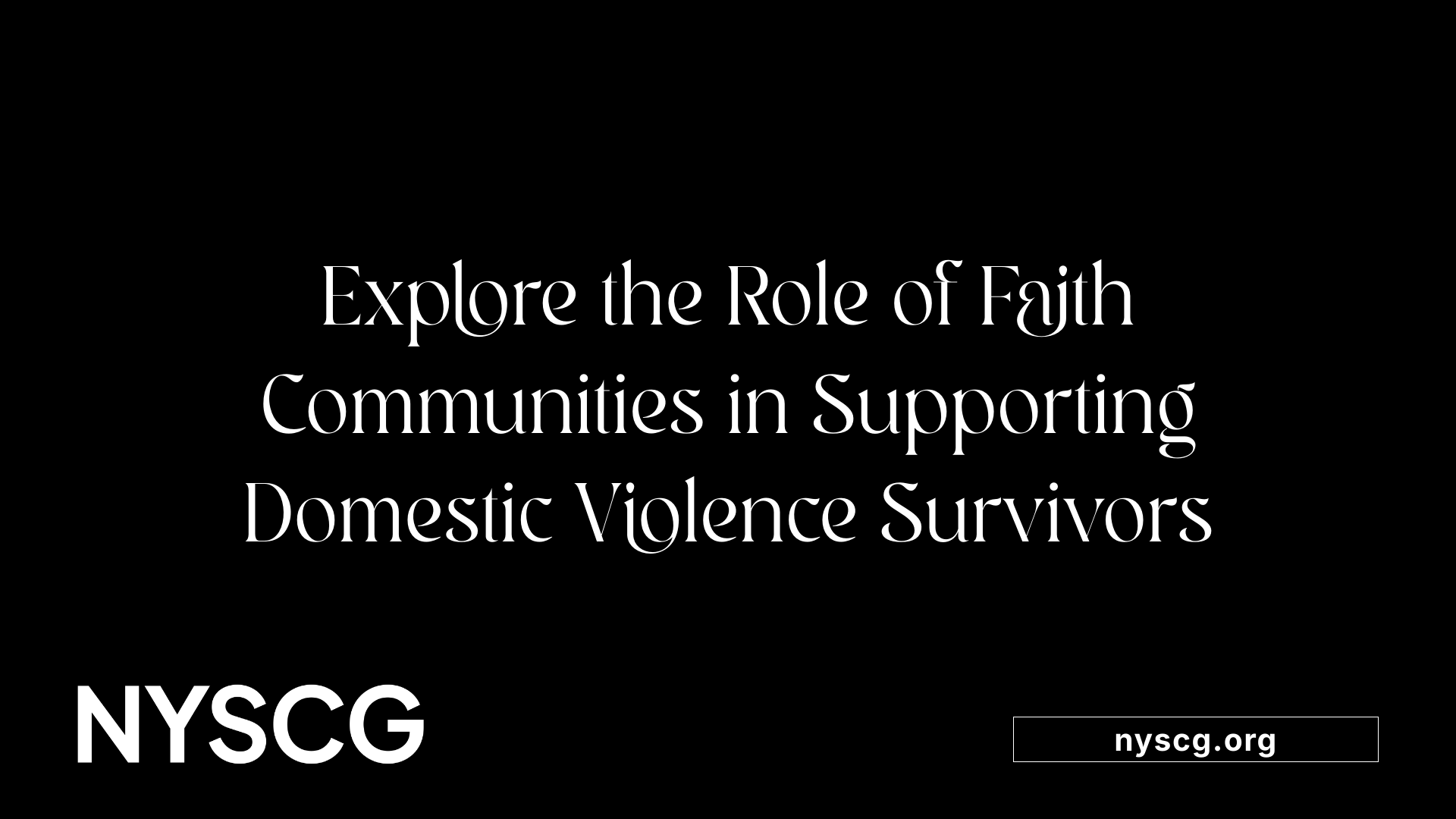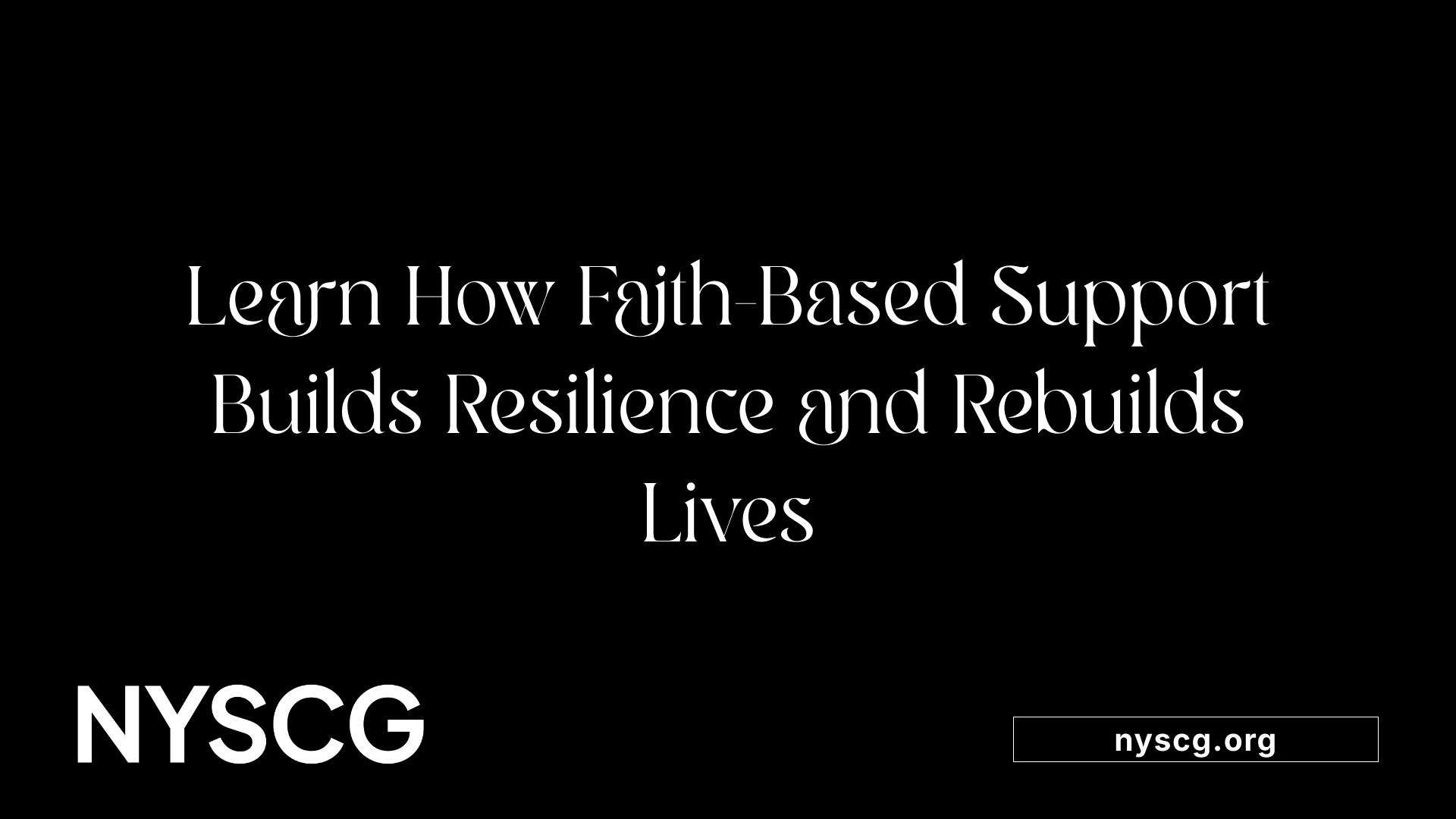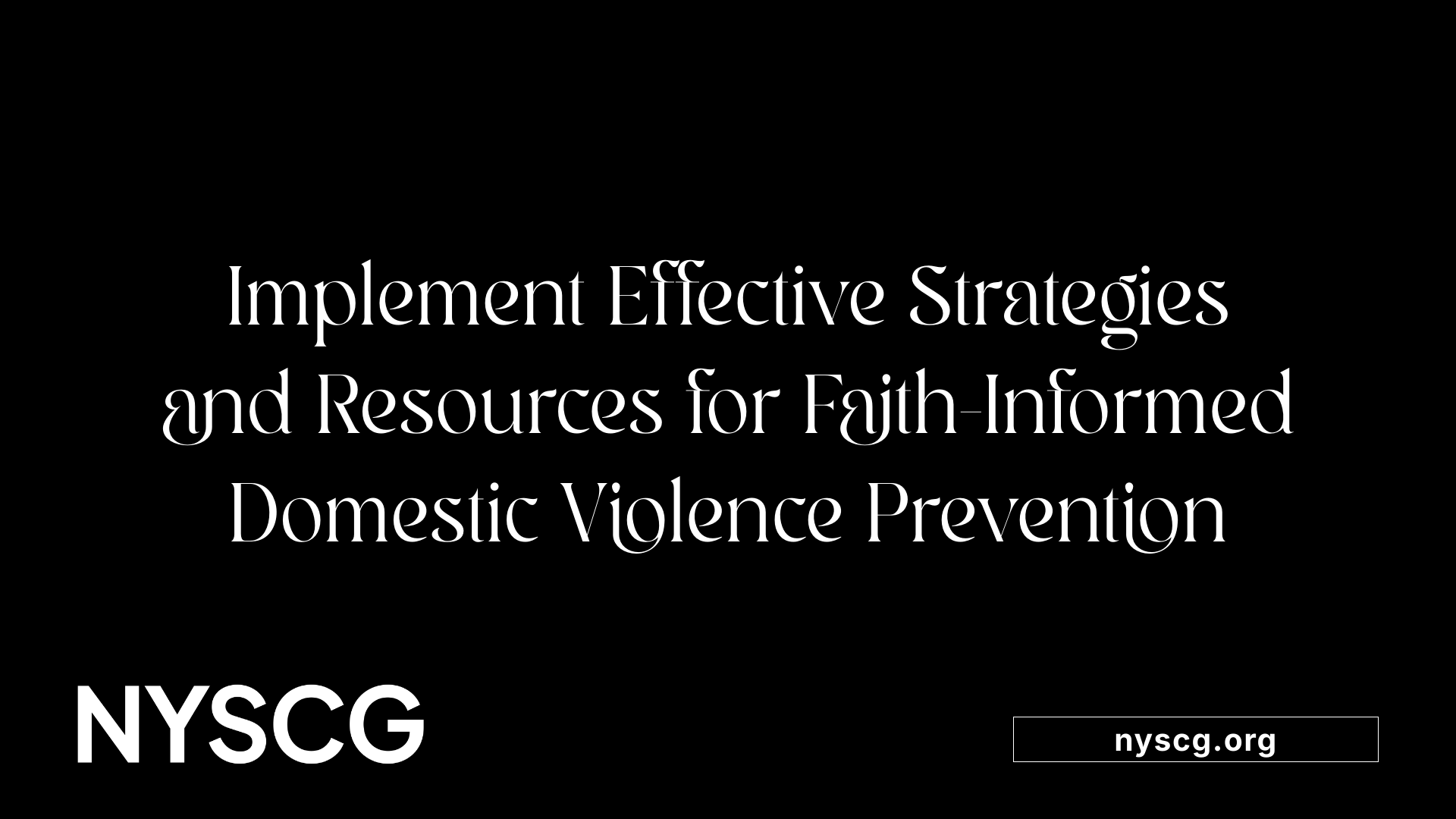Supporting Survivors of Violence Through Faith-Based Counseling


Faith-based counseling offers unique and vital support for survivors of violence, integrating spiritual practices with emotional and practical assistance. This article explores how religious communities and leaders can effectively serve survivors, the resources available, and the ethical considerations necessary for responsible intervention.

Many survivors of domestic violence turn to their faith, spirituality, and religious beliefs as vital sources of strength and resilience. These elements often serve as personal coping mechanisms, helping individuals navigate the pain and trauma associated with their experiences.
Research consistently shows that spirituality provides comfort and support during healing. For example, a study involving 151 battered women found that an overwhelming 97% of them identified spirituality or God as a crucial source of strength. Moreover, 76% of these women reported that their faith offered 'a great deal' of support in their recovery journey.
Spirituality can foster a sense of hope, purpose, and connectedness, which are essential for overcoming trauma. For many, religious practices, prayer, or involvement in faith communities help rebuild their self-esteem and trust, just as they support emotional and psychological healing.
Religious communities and faith leaders are pivotal in providing comprehensive support to survivors. These groups can offer emotional backing, a sense of belonging, security, and often practical assistance such as financial aid or shelter.
Faith leaders are encouraged to recognize domestic violence within their congregations and respond appropriately. With proper training, they can hold perpetrators accountable, support survivors, and refer individuals to specialized services. Faith communities often serve as accessible and trusted safe spaces, particularly in rural or underserved areas where secular services may be limited.
Partnerships between faith organizations and secular institutions enhance the effectiveness of support efforts. Initiatives like the Safe Havens Interfaith Partnership Against Domestic Violence help train faith leaders, develop resources, and encourage interfaith collaboration to end violence. Community education programs, counseling, and support groups tailored for women and marginalized populations, including LGBTQ+ individuals, are often facilitated through these faith-based channels.
While religion can be a force for healing, it is crucial to address the potential misuse of faith to justify or conceal abuse. Proper training and awareness among faith leaders can prevent these issues and promote accountability.
Community responses should prioritize survivor safety, dignity, and holistic healing. Faith leaders are encouraged to interpret scriptures in ways that promote respect, equality, and the inherent worth of all individuals, countering narratives that have historically been used to justify violence.
Spirituality enhances psychological well-being by providing a framework for understanding and coping with trauma. Studies indicate that active religious engagement correlates with improved mental health, increased social support, and higher life satisfaction among survivors.
For many, faith-based services, including counseling and prayer groups, support emotional resilience. Faith communities can advocate for survivors, help rebuild trust, and offer ongoing support through their spiritual teachings and community involvement.
Organizations like FaithTrust Institute and Safe Havens promote training for faith leaders in trauma-informed care and domestic violence response. They develop toolkits and resources, such as 'Between Compassion and Accountability,' guiding faith leaders in effectively addressing abuse.
Programs like the Uconnect Chaplaincy provide spiritual guidance and counseling tailored to survivors’ needs, fostering emotional and spiritual recovery.
In summary, integrating faith and spirituality into domestic violence support strategies creates a comprehensive approach to healing. When churches, mosques, synagogues, and other faith organizations work in partnership with secular agencies, they can significantly improve survivors’ well-being and foster safer, more inclusive communities.
AspectDescriptionSupporting DataFaith as a coping mechanismSpirituality offers strength and comfort97% of battered women rely on faith (study of 151 women)Role of faith communitiesProvide emotional, practical supportExamples include shelter, counseling, advocacyImpact on mental healthImproves well-being, social support76% report faith offers 'a great deal' of supportChallengesMisuse of religion, community stigmaRecognition needed for accountability and awarenessCollaborationsFaith and secular orgs working togetherTraining programs, resource sharing

Faith communities play a vital role in offering various forms of support to survivors of domestic violence. These include emotional support, where survivors find understanding and comfort through compassionate listening and community presence. Spiritual support is equally important; faith communities often provide spiritual counseling, prayer groups, and scripture-based guidance to foster hope and resilience.
Practical assistance is another critical aspect. Many faith organizations offer shelter referrals, financial aid, and access to legal resources. These support services help survivors regain stability and safety as they navigate recovery.
The support can be tailored to suit individual needs, with some communities providing specialized programs for vulnerable groups, including LGBTQ+ individuals or culturally specific services that respect their traditions and norms.
In rural areas, faith communities often serve as the primary support system due to limited access to government or secular services. These communities may be more tightly knit, allowing survivors to find immediate help and continuous support within their faith congregation.
In urban settings, faith organizations typically collaborate with secular agencies to create extensive support networks. They can provide pivotal outreach programs, emergency shelter, and long-term counseling, making a substantial impact amid the diverse needs of a larger population.
These settings underscore the importance of faith-based programs that adapt to their community context, ensuring that survivors receive accessible, relevant, and sustained aid.
Support TypeExamples of Support ActivitiesCommunity ContextEmotional supportCounseling, prayer groups, emotional listeningRural, urbanSpiritual supportScriptures, meditation, faith-based healing practicesBoth settingsPractical supportShelter referrals, financial aid, legal assistanceRural relies more on local faith; urban collaborates with secular agencies
Faith-based programs can significantly contribute to survivors' healing and recovery by creating a nurturing environment that emphasizes trust and hope. They incorporate spiritual practices like prayer, meditation, and connecting with a higher power, which can comfort and empower survivors.
These programs often include counseling, mentorship, and advocacy services that address emotional, spiritual, and practical needs. By respecting survivors' autonomy and integrating trauma-informed approaches, faith initiatives promote resilience and personal growth.
Collaboration with secular organizations ensures a holistic care model that acknowledges the complexity of recovery. Such programs help survivors feel supported, reduce their sense of isolation, and foster pathways toward rebuilding their lives.
Overall, faith communities, through compassionate support and spiritual nurturing, are instrumental in promoting holistic healing for those affected by domestic violence.

Effective responses within faith communities are crucial for addressing domestic and sexual violence. Core strategies include providing spiritual and emotional support, alongside crisis intervention and easy access to professional services. Faith organizations should develop structured protocols to ensure safety, confidentiality, and proper handling of disclosures.
A practical step is establishing dedicated teams such as 'Caring Well Teams', which are trained to recognize abuse signs, address victims' needs compassionately, and refer them appropriately. These teams help create a safe environment that fosters trust and encourages reporting.
Building partnerships with secular organizations, law enforcement agencies, and specialized groups like Sexual Assault Response Teams (SARTs) enhances the capacity of faith communities to provide comprehensive care. These collaborations enable faith leaders to access resources for trauma-informed, culturally sensitive responses.
Organizations such as FaithTrust Institute and Safe Havens Interfaith Partnership offer valuable training, resource development, and technical assistance to support faith-based initiatives. Their programs help leaders understand the complexities of abuse, dispel myths, and build effective intervention strategies.
Faith communities are encouraged to promote awareness by openly speaking out against violence, displaying resources like helpline numbers, and supporting community-wide education efforts. Such actions demonstrate a commitment to justice, healing, and the safety of all members.
In summary, combining spiritual guidance with concrete, best-practice protocols and collaborative partnerships ensures that faith-based responses to domestic and sexual violence are effective, respectful, and survivor-centered.
Resource/PracticeDescriptionAdditional NotesCaring Well TeamsTrained groups within faith communities to handle abuse disclosures safelyFocus on confidentiality and trauma-informed carePartnerships with Law EnforcementCollaborative efforts to ensure consistent support and interventionStrengthens community safety and accountabilityTraining Programs (e.g., FaithTrust, Safe Havens)Offer workshops on recognizing abuse, responding appropriately, and preventionEssential for faith leader preparedness and awarenessCulturally Sensitive ResponseTailoring responses to respect diversity and individual needsReduces risk of re-traumatizationPublic Awareness CampaignsEngage community in discussion, dispel myths, promote preventionBreaks down barriers and stigma
By implementing these resources and best practices, faith communities can serve as powerful allies in combatting domestic and sexual violence, ensuring that survivors receive the support, safety, and justice they deserve.

Faith-based programs play a crucial role in supporting survivors on their journey toward healing. These initiatives foster a sense of belonging and safety within a community that understands and respects spiritual beliefs. Incorporating practices such as prayer, meditation, and connecting with a higher power, these programs offer comfort and hope amid pain.
In addition to spiritual support, faith communities often provide counseling, mentorship, and advocacy services. These measures address emotional wounds and promote forgiveness, personal growth, and resilience.
Collaborating with secular organizations and applying trauma-informed approaches ensures that survivors' autonomy and individual needs are prioritized. Integrating spiritual, emotional, and social support creates a holistic environment conducive to recovery.
Overall, faith-based efforts strengthen coping mechanisms, reduce feelings of isolation, and help survivors rebuild their lives through compassionate, culturally sensitive, and empowering interventions.
Spirituality and faith are powerful tools that aid survivors of domestic violence in rebuilding their lives. Many survivors find strength and hope through their religious beliefs, which can foster emotional resilience and provide a sense of community and belonging. These spiritual connections help individuals derive meaning from their experiences, encouraging acceptance and reducing negative feelings such as guilt and fear.
Incorporating spiritual practices like prayer, meditation, or participation in faith-based community activities offers emotional comfort and can lower stress, supporting mental health. Healthcare providers understand that acknowledging a survivor’s spiritual life enhances holistic care, builds trust, and promotes healing in all dimensions—emotional, psychological, social, and spiritual. Ultimately, faith supports survivors in finding inner peace, fostering recovery, and connecting with something greater than themselves.
Faith communities are uniquely positioned to identify and support victims of abuse. Recognizing signs of violence involves training faith leaders and members to spot behavioral and physical indicators—such as withdrawal, injuries, or sudden changes in behavior. Establishing clear, culturally sensitive protocols ensures victims are safely connected to professional resources. Effectively responding requires prompt action, education, and a sincere commitment to safeguarding community members.
When faith leaders are equipped with knowledge and proper tools, they can foster environments where victims feel safe to disclose abuse without fear of shame or silence. Active collaboration with secular support organizations and ongoing education campaigns enhance community awareness. By speaking out against abuse from the pulpit and promoting messages rooted in love, respect, and justice, faith communities can become active agents in preventing violence and supporting healing for survivors.
Supporting survivors of violence through faith-based counseling requires a comprehensive, culturally sensitive approach that combines spiritual, emotional, and practical support. Faith communities hold unique influence and can serve as powerful agents of healing, provided they are well-trained, ethically guided, and actively collaborate with secular experts. Building awareness about abuse, recognizing the signs, and fostering safe, judgment-free environments are essential steps. Ultimately, integrating faith and trauma-informed care can promote resilience, justice, and holistic recovery for survivors, shaping healthier communities where hope and healing flourish.
All you need is the will to make the world a better place.
New York State chaplain group inc. is a tax deductible organization with a federal tax Id number 92-383-4921